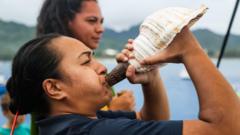Mining the Cook Islands' seabed prompts a contentious debate where environmental activists clash with government officials advocating for economic advancement. The focus is on polymetallic nodules, rich in metals needed for modern technology, yet their extraction poses significant risks to fragile marine ecosystems.
Jean Mason, curator of the Cook Islands Library and Museum, has long championed the mining of these nodules, which could substantially improve the nation’s economy. “We've been talking about this for 50-plus years - I think the moratorium time is over,” she states, holding evidence from the past when these nodules were mostly dismissed.
As early as the 1960s, these valuable resources captured the attention of scientists, but it wasn't until crises like the Covid pandemic and rising climate threats that the Cook Islands considered deep-sea mining as a potential economic lifeline. “Nothing we do in life is risk-free,” insists Hans Smit from Moana Minerals, one of the exploration companies involved, echoing the sentiment of some who see this initiative as an opportunity for ocean states to utilize their own resources.
Rima Brown of the Seabed Minerals Authority points out the significant potential of the Cook Islands' territorial waters, stating, “While we're only about 200 square kilometers in land mass, we have an exclusive economic zone of almost 2 million square kilometers.” This vast area offers rich resources, fueling government desire to move forward with mining.
However, opposition exists from various corners within the islands. Activists argue for a delay in mining activities until more robust scientific research on environmental impacts is conducted. Alanah Matamaru Smith from the Te Ipukarea Society articulates the locals’ concerns, “We are asking for more time for robust independent research.” Even among islanders, opinions vary, especially in smaller hamlets where many fear the repercussions of standing against the tide.
Prime Minister Mark Brown, who also oversees tourism and seabed minerals, envisions a future for the Cook Islands akin to Norway’s wealth from similar resources. He argues that without tapping into their seabed, larger emitting nations unfairly limit the islands’ potential to secure funding for development and sustainability.
Yet, skepticism remains. Activist June Hosking reflects on the caution seen in outer islands where open discussions are limited by community ties and fear of discord. "You can't drive very far in neutral," she asserts, advocating for transparency and proactive engagement in the decision-making processes that could determine their collective future.
As the Cook Islands navigate these waters, the question looms: can they balance the immediate economic allure of deep-sea mining against the enduring need to protect the health of their environment and the future prosperity of their communities?





















